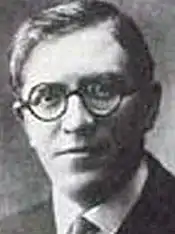Julio Álvarez del Vayo
Julio Álvarez del Vayo (1890 in Villaviciosa de Odón, Community of Madrid – 1975 in Geneva, Switzerland) was a Spanish Socialist politician, journalist and writer.

Biography
Álvarez studied Law at the Universities of Madrid and Valladolid and he did postdoctoral work at the London School of Economics. He joined the Spanish Socialist Workers' Party (PSOE) at a very young age and he opposed to the collaboration of that party with the dictatorship of Primo de Rivera (1923–1930). He wrote for the newspapers La Nación of Argentina, El Liberal and El Sol of Spain, and The Guardian of Britain. He visited the United States, the European fronts during the First World War and the Soviet Union as a journalist. In 1930 he conspired for an armed uprising against the Monarchy. When the Second Republic was proclaimed he was appointed ambassador to Mexico and to the Soviet Union, and later he was elected a member of the Parliament. He followed the PSOE's revolutionary wing led by Largo Caballero.
During the Civil War he held several political offices on the Republican side: he was twice minister of Foreign Affairs, delegate to the League of Nations and commissar and general of the Army. He was a member of the peace commission which monitored the dispute between Bolivia and Paraguay in 1933, at the peak of the Chaco War.[1] After the Francoist conquest of Catalonia and while the majority of the Republican leaders decided to remain in France, he returned to the Republican zone and led the last attacks against the Francoist troops. He fled by airplane from the base in Monòver, Alicante shortly before the armistice.
During the 1940s and 1950s Álvarez del Vayo lived in exile in Mexico, the United States and Switzerland. He radicalized his political positions and was expelled from the PSOE. He then founded the Unión Socialista Española, which was very close to the Communist Party of Spain. In 1963, following the abandoning of armed struggle by the Communist Party and the waning of the activity of the Spanish Maquis, Álvarez del Vayo felt the need for a pro-Republican movement carrying out the armed struggle within Spain and established the Spanish National Liberation Front (FELN). However, the FELN as a group remained small and its activity was very limited owing to the effectiveness and fierceness of the Spanish police network. Finally in 1971 Álvarez del Vayo's FELN was integrated into the Revolutionary Antifascist Patriotic Front (FRAP).[2] Álvarez del Vayo was the acting president of FRAP at the time of his death, which occurred on 3 May 1975 after suffering a cardiac failure on 26 April.[3]
Writings
- La nueva Rusia. En camión por la estepa. Las dos revoluciones, siluetas..., Madrid: Espasa-Calpe, 1926
- La senda roja, Madrid: Espasa-Calpe, 1928
- La guerra comenzó en España: lucha por la libertad, Mexico City: Séneca, 1940
- Freedom's battle, New York: Knopf, 1940
- The last optimist, London: Putnam, 1950
- Reportaje en China. Presente y futuro de un gran pueblo, Mexico City: Grijalbo, 1958
- China vence, Paris: Ruedo Ibérico, 1964
- The March of Socialism, New York: Hill and Wang, 1974
- Give me combat, Boston: Little Brown, 1973 (memoir)
References
- Farcau, Bruce W. (1996). The Chaco War: Bolivia and Paraguay, 1932-1935. Greenwood Publishing Group, p. 152. ISBN 0-275-95218-5
- FRAP - Del Vayo Archived 2012-02-13 at the Wayback Machine
- Última entrevista con Álvarez del Vayo (in Spanish)